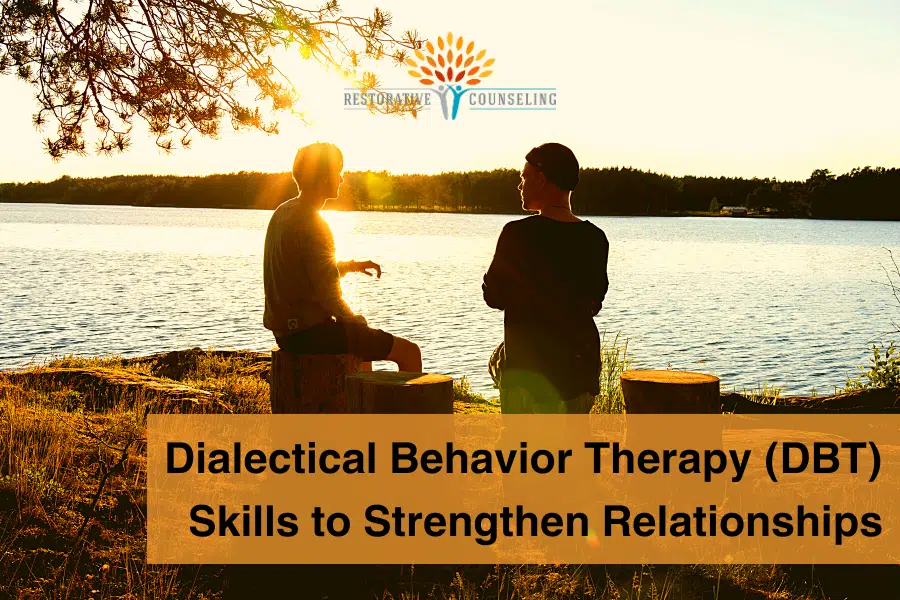Written by Katie Jackson-Griffin, LCPC
Relationships with others are essential. They provide support, companionship, fun, and connection. They can also be a source of stress if you feel that you aren’t getting what you need. It’s common to struggle with maintaining relationships from time-to-time. Sometimes, struggling with a relationship can feel isolating, lonely, and frustrating. Dialectical Behavior Therapy (DBT) offers a useful set of interpersonal effectiveness skills that can help you feel confident in creating fulfilling relationships.
Navigate relationship challenges confidently with these 3 DBT skills
1. Assertiveness
I’m sure you’ve heard of this term before, but what does it actually mean? Being assertive is all about asking for what you need. The first step is to identify what you want from a relationship. Try reflecting on your values and needs in the current moment. You can ask yourself questions like:
“What brings me joy in a relationship?”
“Am I looking for someone to do new activities with?”
“Do I want someone to have the time and capacity for phone calls?”
Once you have identified what is most important to you, you can move on to communicating what you want.
Statements that are clear, concise, and direct make a huge impact. For example, if you have a friend that hasn’t been giving you what you need recently, you might consider saying something like, “I would like to talk to you on the phone more frequently. I understand that you are busy and I’m happy to work with you on this. How can we make it happen?” This phrasing acknowledges the challenges the situation might pose and asserts what you need.
Practicing assertiveness helps you be clear about what type of relationship you’re looking for and expectations for the relationship. Also, it gives the other person a chance to consent to the relationship. Unfortunately, there is always a risk of a relationship ending if the other person does not agree with your needs. However, the relationship ending may likely be for the best since the relationship can’t be fulfilling for both parties.
Learn how to use DBT skills to have fulfilling relationships
2. Boundary setting
Boundaries are essential when it comes to protecting yourself and others. Also, they help a relationship grow. There are several different types of boundaries:
- Psychological boundaries: how much and what information you share about yourself, opinions, thoughts, and beliefs
- Emotional boundaries: whether or not (or how much) you let other people influence your feelings such as happiness, guilt, sadness, etc.
- Physical boundaries: any activity regarding your body
Since everyone has different boundaries, it is important to discuss them openly. When you’re able to verbalize your boundaries, you give the other person in the relationship an opportunity to reflect on their needs and comfort level, too. Here’s an example of how that might look:
Type of boundary: Psychological
Situation: Luke and their partner, James, are headed to a dinner with James’ immediate family. James is uncomfortable with sharing about future planning, such as if they are planning to get married or have children. James is concerned about judgment and would rather keep this information private. Luke feels uncomfortable due to feeling like they are “keeping a secret” or that they are ashamed of their plans. Luke would like to share more with their family.
Discussion: Luke likes to be very open and transparent with others about what is going on with their life. However, he wants to respect that James has a different comfort level and different relationship with their parents and siblings. Luke agrees to not share about any decisions that they haven’t fully made yet or are still thinking about. Instead, they can focus on sharing other details about their lives such as hobbies, interests, work, and political opinions. They agree that they can share about an engagement once it happens, and Luke can discuss future planning in other relationships.
Result: Luke and James were able to discuss what each of their needs were so that each person knew what to expect at the dinner with James’ family. Both parties were able to get some of what they wanted. James gets more privacy. Luke gets to feel like their authentic self by sharing details about their lives.
In this example, Luke and James were able to grow in their relationship by demonstrating mutual understanding about their needs and comfort level with sharing. Thus, their discussion potentially reduced the chance of future conflict. Ultimately, making decisions based on each person’s boundaries can help enhance the connection and satisfaction in a relationship.
3. Navigating conflict
Conflict in relationships is inevitable. It can bring about a great deal of stress and dissatisfaction if not dealt with properly. Having tools to manage these situations can reduce anxiety and help you move past conflict faster. Here’s a DBT interpersonal effectiveness process to help navigate conflict:
Skill 1: Validate the other person’s point-of-view
Often, conflict escalates because people don’t feel that they are being understood. It can be beneficial to show the other person that you hear them by validating their perspective. However, this doesn’t mean that you have to agree with them. You are simply highlighting that you have heard and understand their point-of-view. Try saying a statement like, “I hear you that you are feeling overwhelmed with the amount of activities we have to do on Sunday. On my part, I think it is important that we honor our commitments.”
Skill 2: Repeat your point-of-view
When emotions are heightened, it can be difficult to explain yourself. Also, you may find it difficult to listen to the other person. Try to focus on using simple, concise statements. For the previous situation, if the conversation were to escalate, it may be helpful to repeat a simple statement like, “It is important to me that we honor our commitments.”
Skill 3: Ask for specifics
Initially, homing in on what you want can help to find a solution. In the same vein, when in conflict, it can be difficult to know what the other person really wants. You can get lost in the “noise” of the emotions and accusations. Try to use phrasing such as, “What specifically about this event is making you feel overwhelmed?” This gives you an opportunity to understand the other person’s point-of-view better, thus creating the opportunity for compromise.
These three DBT skills can give you the confidence to navigate conflict more effectively! It’s useful to have specific tools to turn to when you’re feeling stressed.
Ultimately, relationships take work. It can be tiring to do this work on your own. Restorative Counseling is here to help!
The Restorative Counseling team recognizes how much relationships can impact a person. We’re here to help you develop the tools you need to help your relationships flourish. If you are interested in gaining support, schedule an appointment today.

Hi, I’m Katie!
I use HAES and DBT approaches to help people overcome their challenges with low self-esteem, anxiety, and depression. Read more about me.
Follow Restorative Counseling
Sign up for our newsletter

